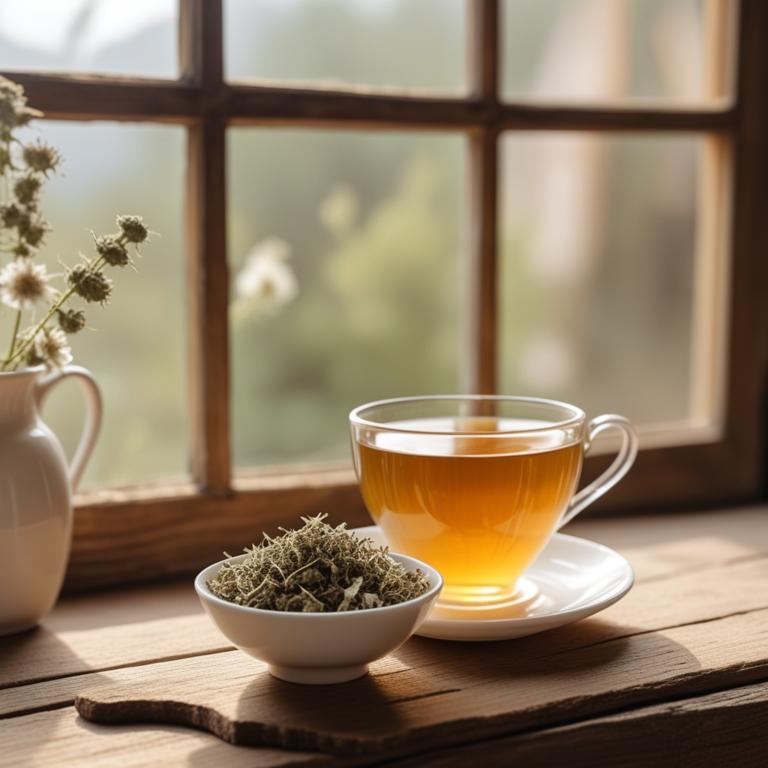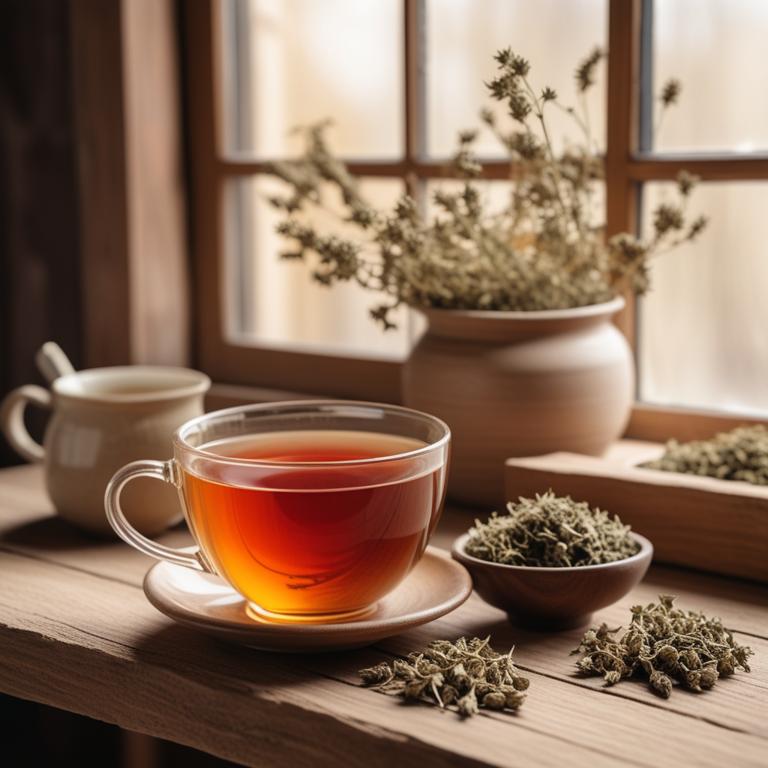8 Herbal Teas For Ulcerative Colitis

If you have ulcerative colitis, you know how uncomfortable it can be.
But did you know that some herbal teas can help?. These teas are made from plants that have anti-inflammatory properties, which can reduce the swelling and pain in your digestive system. Let's take a closer look at three examples: Curcuma longa, Zingiber officinale, and Glycyrrhiza glabra. Curcuma longa, also known as turmeric, contains a powerful compound called curcumin. This compound has strong anti-inflammatory properties, which can help reduce the inflammation in your gut and alleviate symptoms like diarrhea and abdominal pain. Turmeric tea has been used for centuries in traditional medicine to treat digestive issues. Another herb that can help with ulcerative colitis is Zingiber officinale, or ginger. Ginger has anti-inflammatory properties that can help reduce pain and inflammation in the digestive system.
It can also help with nausea and vomiting, which are common symptoms of ulcerative colitis. Ginger tea is easy to make and can be enjoyed hot or cold. Glycyrrhiza glabra, also known as licorice root, has been used for centuries to treat digestive issues, including ulcerative colitis. Licorice root has anti-inflammatory properties that can help reduce inflammation in the gut and alleviate symptoms like abdominal pain and diarrhea. It can also help soothe the lining of the digestive tract, reducing irritation and inflammation. Drinking herbal teas like these can bring many benefits to your life. For one, they can help you manage your symptoms and reduce your reliance on medication. They can also help you feel more comfortable and relaxed, especially during flare-ups.
Additionally, these teas are often caffeine-free and can be enjoyed at any time of day, making them a great alternative to regular tea or coffee.
- 1. Curcuma longa
- 2. Zingiber officinale
- 3. Glycyrrhiza glabra
- 4. Taraxacum officinale
- 5. Aloe barbadensis
- 6. Althaea officinalis
- 7. Ulmus rubra
- 8. Silybum marianum
1. Curcuma longa

Curcuma longa teas contains active compounds like curcumin, demethoxycurcumin, and bisdemethoxycurcumin, which have strong anti-inflammatory properties.
These compounds work by blocking the production of inflammatory molecules called cytokines, which contribute to the inflammation and damage seen in ulcerative colitis. Curcumin also has potent antioxidant properties, which help to reduce oxidative stress and protect the lining of the colon from damage. Additionally, curcumin has been shown to modulate the gut microbiome, reducing the growth of harmful bacteria and increasing the production of beneficial short-chain fatty acids.
By reducing inflammation, oxidative stress, and altering the gut microbiome, Curcuma longa teas may help alleviate symptoms of ulcerative colitis.
- Gather 1 teaspoon of dried Curcuma longa root powder, 1 cup of boiling water, and a tea infuser or strainer.
- Add the Curcuma longa root powder to the tea infuser or strainer.
- Pour 1 cup of boiling water over the powder and let it steep for 5-7 minutes.
- Strain the tea into a cup and discard the solids.
- Drink the tea immediately and repeat as needed, ideally 2-3 times a day.
2. Zingiber officinale

Zingiber officinale teas contains compounds like gingerol and shogaol, which have potent anti-inflammatory properties.
These properties help reduce swelling and ease inflammation in the digestive tract, a common issue for people with ulcerative colitis. The antioxidant properties of ginger also help protect the body from damage caused by free radicals, which can exacerbate symptoms of ulcerative colitis. Additionally, ginger's ability to relax the muscles in the digestive tract can help alleviate cramping and spasms associated with the condition.
By reducing inflammation and protecting the digestive system, Zingiber officinale teas may help alleviate symptoms and improve quality of life for people with ulcerative colitis.
- Boil 1 cup of water in a kettle or on the stove.
- Take 1 tablespoon of fresh or dried Zingiber officinale root, and chop it into small pieces.
- Add the chopped Zingiber officinale root to the boiling water, and let it simmer for 5-7 minutes.
- Strain the tea into a cup using a fine-mesh sieve or cheesecloth, and discard the root pieces.
- Drink 1 cup of the tea 2-3 times a day, as needed, and after consulting with a healthcare professional.
Zingiber Officinale Tea on Amazon
FGO Organic Ginger Tea, 100 Count, Eco-Conscious Tea Bags, Caffeine Free, Packaging May Vary (Pack of 1)
Disclaimer: We earn a commission if you click this link and make a purchase at no additional cost to you.
3. Glycyrrhiza glabra

Glycyrrhiza glabra teas contains compounds like glycyrrhizin and flavonoids, which have anti-inflammatory properties that help reduce inflammation in the digestive tract.
Glycyrrhizin inhibits the production of a chemical called 11-beta-hydroxysteroid dehydrogenase, which can contribute to inflammation in the gut. The flavonoids in Glycyrrhiza glabra teas also have antioxidant properties, which help protect the gut lining from damage and promote healing. Additionally, glycyrrhizin and flavonoids can help improve the integrity of the gut lining, reducing permeability and alleviating symptoms of ulcerative colitis.
By reducing inflammation and protecting the gut lining, Glycyrrhiza glabra teas may help alleviate symptoms of ulcerative colitis.
- Get 1 cup of water and boil it.
- Take 2-4 grams of dried Glycyrrhiza glabra root.
- Crush the root into small pieces and put them in a tea infuser.
- Steep the root in the hot water for 5-7 minutes.
- Strain the tea and drink 1-2 cups per day as needed.
4. Taraxacum officinale

Taraxacum officinale teas contains bioactive constituents like flavonoids, phenolic acids, and sesquiterpene lactones, which have anti-inflammatory properties.
These compounds help reduce inflammation and oxidative stress in the digestive tract, a key factor in the development of ulcerative colitis. The flavonoids, particularly quercetin, have potent antioxidant effects that protect the gut lining from damage and promote healing. The phenolic acids, such as caffeic acid, have antimicrobial properties that help control the growth of harmful bacteria in the gut, further contributing to the relief of symptoms.
By modulating the gut microbiome and reducing inflammation, Taraxacum officinale teas may provide relief from symptoms of ulcerative colitis, such as abdominal pain and diarrhea.
- Gather 1 cup of fresh Taraxacum officinale leaves and flowers.
- Heat 1 cup of water in a pot until it starts boiling.
- Add 2 tablespoons of the Taraxacum officinale leaves and flowers to the boiling water.
- Reduce heat and let it simmer for 5-7 minutes.
- Strain the tea into a cup and drink 1-2 cups, 2-3 times a day.
5. Aloe barbadensis

Aloe barbadensis teas contains a high concentration of acemannan, a bioactive polysaccharide that stimulates the growth of beneficial gut bacteria.
It also contains glycoproteins, which have anti-inflammatory properties that help reduce inflammation in the digestive tract. The anti-inflammatory properties of aloe barbadensis teas, particularly the presence of aloemodin and aloe-emodin, can help soothe and calm the lining of the colon, reducing symptoms of ulcerative colitis. Additionally, aloe barbadensis teas contains vitamins and minerals, such as vitamins A, C, and E, that help protect the gut lining from damage and promote healing.
By reducing inflammation and promoting healing, aloe barbadensis teas can help alleviate symptoms of ulcerative colitis.
- Gather 1 cup of Aloe barbadensis gel, 1 cup of water, and a tea strainer.
- Pour the water into a pot and bring to a boil. Reduce heat and let simmer for 5 minutes.
- Add the Aloe barbadensis gel to the pot and stir well. Let simmer for another 5 minutes.
- Strain the tea into a cup using the tea strainer. Discard the solids.
- Drink the tea 2-3 times a day, as needed, to help soothe ulcerative colitis symptoms.
6. Althaea officinalis

Althaea officinalis teas contains mucilages, polysaccharides, and flavonoids that provide relief for ulcerative colitis.
The mucilages, especially galactose and arabinose, help to soothe and protect the mucous membranes in the colon, reducing inflammation and discomfort. The polysaccharides, particularly rhamnose and xylose, have anti-inflammatory properties that help to reduce the severity of symptoms. The flavonoids, such as kaempferol and quercetin, act as antioxidants, neutralizing free radicals that can damage the colon lining.
By reducing inflammation and promoting healing, Althaea officinalis teas can help to alleviate the symptoms of ulcerative colitis.
- Gather 1 cup of dried Althaea officinalis root and 1 cup of water in a saucepan.
- Bring the water to a boil, then reduce heat to medium-low.
- Add the dried Althaea officinalis root to the water and let it steep for 5-7 minutes.
- Strain the mixture into a cup and discard the solids. Add honey to taste.
- Drink the tea 2-3 times a day as needed to help manage ulcerative colitis symptoms.
7. Ulmus rubra

Ulmus rubra teas contains salicin, a bioactive constituent similar to aspirin.
Salicin has anti-inflammatory properties, which can help reduce swelling and inflammation in the digestive tract. The tea also contains flavonoids, such as quercetin and kaempferol, that have antioxidant properties, protecting the gut from damage caused by free radicals. The anti-inflammatory and antioxidant properties in Ulmus rubra teas may help alleviate symptoms of ulcerative colitis, such as abdominal pain and diarrhea, by reducing inflammation and promoting healing in the digestive tract.
Regular consumption of Ulmus rubra teas may also help improve the overall health of the gut lining, reducing the risk of future flare-ups.
- Gather 1 cup of fresh Ulmus rubra leaves and 2 cups of water.
- Chop the leaves and put them in a saucepan.
- Boil the water and pour it over the chopped leaves. Let it steep for 5-7 minutes.
- Strain the mixture and add 1 tablespoon of honey to taste. You can also add lemon juice if desired.
- Drink 1 cup of the tea 2-3 times a day, as needed, to help manage symptoms of ulcerative colitis.
8. Silybum marianum

Silybum marianum teas contains flavonoids, terpenoids, and saponins as its bioactive constituents.
These compounds have anti-inflammatory properties, which can help reduce inflammation in the digestive tract associated with ulcerative colitis. Silymarin, a key component of saponins, has antioxidant properties that protect the gut from damage caused by free radicals. Flavonoids in Silybum marianum teas have immunomodulatory effects, which can help regulate the immune response and reduce inflammation in the colon.
By reducing inflammation and protecting the gut lining, Silybum marianum teas may help alleviate symptoms of ulcerative colitis.
- Gather 1 cup of fresh Silybum marianum flowers and leaves. Clean them with water to remove dirt.
- Dry the Silybum marianum flowers and leaves in a low-temperature oven (150°F - 200°F) for 1-2 hours.
- Grind 2 tablespoons of dried Silybum marianum flowers and leaves into a fine powder using a coffee grinder or mortar and pestle.
- Steep 1 teaspoon of the powder in 1 cup of boiling water for 5-10 minutes. Strain the liquid and discard the solids.
- Drink the tea 2-3 times a day, ideally between meals, to help manage ulcerative colitis symptoms.